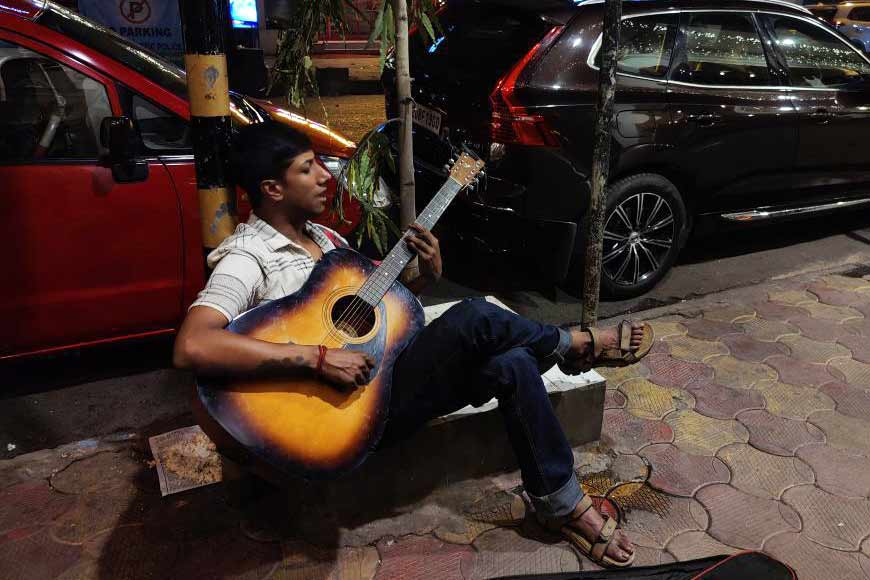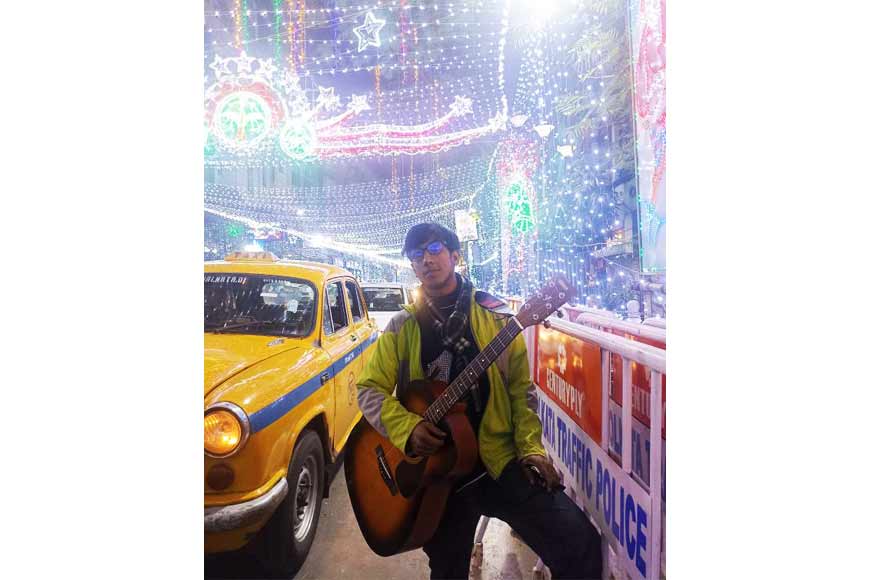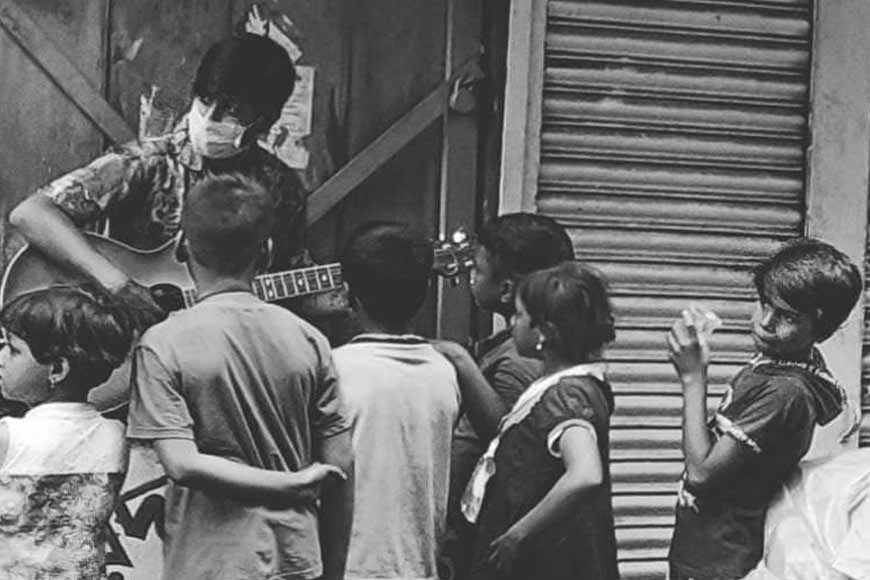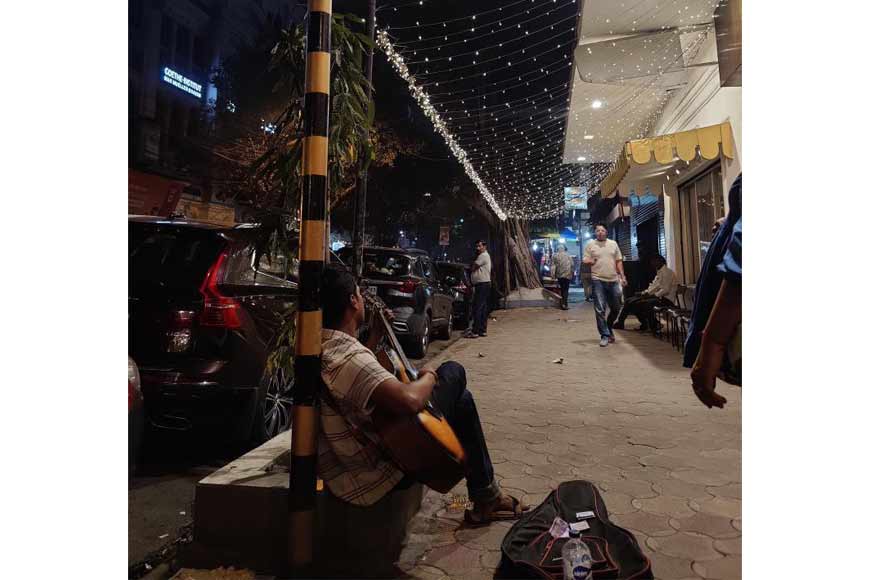Rishav Ghosh breaks taboo by singing on the streets—GetBengal story

Music appreciation can happen anywhere, from lively concerts to impromptu performances in cafes, restaurants, pubs, bars, and even on the streets. Imagine singing your heart out on a bustling sidewalk, with passersby pausing to listen, perhaps even joining in. These moments bring a refreshing break to the routine of daily life.
In Europe, such street performances are a common sight, whether in the vibrant downtowns of Brussels or the elegant neighbourhoods of Austria. Picture a violinist lost in his music, playing a beautiful tune on a cobbled pathway, his open case collecting donations from appreciative pedestrians and tourists.
Recently, similar scenes have been spotted on the streets of Kolkata, be it the iconic Park Street, the bustling Camac Street, or the quieter corners of South Kolkata. Music truly has the power to transform any space, bringing people together and adding a touch of joy to their day.
These street musicians or buskers, are not just singers but also instrumentalists like Rishav Ghosh, who is a teacher by profession but enjoys sharing his love for music on the streets. These individuals bring a unique charm to Kolkata's evenings, creating a vibrant and inclusive atmosphere where everyone, regardless of their background, can enjoy the magic of music.

Rishav's story is inspiring, showcasing how a passion for music can thrive and bring joy to others, even without formal training. His talent in singing and playing guitar, self-taught through observation and practice, highlights his dedication and love for music.
Ghosh teaches music in Narayana School, Maheshtala during the day. By night he transforms the streets with his music, entertaining people in front of Mocambo on Park Street. He also enchants at Coffee House, various ghats along the Hooghly, and so on.When asked why he loved to sing on the streets, he said, “I sing on the streets because no one knows me.”
He further adds that he wishes to reach out to more people. “It is not only about earning money. It's about reaching out,” he added. A lot of people view street singing as a form of beggary in India. Despite facing misconceptions about street singing, he remains steadfast in his belief that it is a form of self-employment and a means to reach out to a wider audience. Rishav's perspective challenges this notion, emphasising that street musicians are providing a service that brings joy to others and should be respected as such. His story serves as a reminder to consider the diversity and depth of motivations behind street performances.To all people who associate street singing with beggary and homogenise them, he says, “You need to think about it more widely.”He further adds that several members of his family think that he sings on the streets to beg for money. He simply does not pay attention to them. “I really don’t care because they do not feed me. I feed myself.”
Ghosh acknowledges that street singing is a well-established tradition in Europe and America, where artists like Ed Sheeran and B.B. King have emerged from such beginnings. He notes that this trend is gradually gaining momentum in India as well, with more people appreciating the concept of performing music on the streets. His own experiences singing on the streets reflect this growing acceptance.

He points to artists like Rupam Islam, who started his career through "busking," as inspiration. Rupam Islam has since become immensely popular, known for iconic songs like "Benche Thakar Gaan" and "Ei Srabon." Seeing the success of such artists motivates Ghosh to continue pursuing his passion for music.
Rishav Ghosh says he knows he may never be as popular as Rupam Islam, but he can still try to unite people through music. He recognizes the historical significance of music in movements like the freedom struggle, where songs became rallying cries for independence. “For instance, during the freedom struggle, songs like Karar Oi Louho Kopat and Vande Mataram inspired many to fight against the British Raj.” His belief that music can unite people in ordinary circumstances, not just during wars or revolutions, reflects a deep understanding of its universal appeal.
“I believe that the seven notes of music can be used to unite people,” he states proudly.
It's impressive that Rishav not only sings but also writes and composes his own songs, adding a personal touch to his performances. His commitment to self-expression and originality is commendable, even if his original songs don't always attract large crowds.
His own songs include Hariye Jawar Gaan, Shey Chole Gelo Bhalobeshe etc. Drawing inspiration from Rupam Islam, as well as his own emotions and experiences, Rishav's songs reflect a blend of influences that make them unique and heartfelt. His dedication to his craft, despite the challenges of street performing, is a testament to his passion for music.

Rishav's story is a testament to the fact that many people, both known and unknown, have started their lives and careers from humble beginnings. His belief in starting from scratch to grow and evolve is a valuable lesson for personal development and skill improvement.
He highlights the importance of patience and consistency in fostering any passion or skill, emphasising that these principles apply not just to music but to all fields. His message to believe in oneself and keep going resonates strongly, serving as a reminder that perseverance is key to achieving success in any endeavour.











